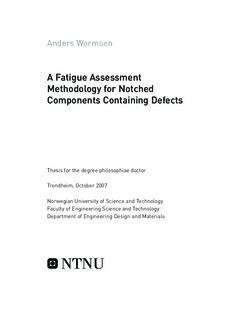A Fatigue Assessment Methodology for Notched Components Containing Defects
Doctoral thesis
Permanent lenke
http://hdl.handle.net/11250/241301Utgivelsesdato
2007Metadata
Vis full innførselSamlinger
Sammendrag
A probabilistic fatigue assessment tool, P•FAT, directly applicable to the results from a standard finite element stress analysis has been developed. The fatigue assessment tool consist of two deterministic fatigue assessment methods:
• ‘Local stress approach’ – Life prediction based on the equivalence between the most highly stressed point of a component and a standard smooth fatigue specimen under the same stress.
• ‘Single defect approach’ – Life prediction based on the growth of a single ‘worst-case’ crack-like defect at the location of maximum stress.
And of two probabilistic fatigue assessment methods:
• ‘Weakest-link approach’ – Assumes the probability of survival of a component to be the product of the probabilities of survival of the (small) elements into which the component has been divided for the purpose of analysis. The probability of survival of an element is a function of the stress cycle, fatigue strength and the size of the element.
• ‘Random defect approach’ – The model is based on a finite element stress analysis and assumptions on the defect distribution as well as a theory for the growth of short cracks. Each finite element is associated with one ormore defects by ‘drawing’ from a Poisson distribution. The initial posistion of a defect is obtained from a uniform distribtuion while its size is obtained from an extreme value distribution. The defects are considered to be cracklike, and the number of cycles required for each defect to become critical is determined. By carrying out a large number of such simulations, the fatigue life distribution of the component is obtained.
This thesis presents the theory behind the above fatigue assessment methods. In addition, asymptotic K and J solutions for a crack emanating from the root of a notch have been presented.
Består av
Wormsen, Anders; Härkegård, Gunnar; Huth, H. J. Probabilistic fatigue assessment of a hydro-turbine blade model. Proceedings of the International Fatigue Congress, Atlanta USA, 2006.Wormsen, Anders; Fjeldstad, Arne; Härkegård, Gunnar. A post-processor for fatigue crack growth analysis based on a finite element stress field. Computer Methods in Applied Mechanics and Engineering. 197: 834-856, 2008.
Fjeldstad, Arne; Wormsen, Anders; Härkegård, Gunnar. Simulation of fatigue crack growth in components with random defects. Engineering Fracture Mechanics. 75(5): 1184-1203, 2008.
Fjeldstad, Arne; Wormsen, Anders; Härkegård, Gunnar. A reanalysis of Frost’s classical fatigue tests on self-arresting cracks at notches. .
Wormsen, Anders; Fjeldstad, Arne; Härkegård, Gunnar. The application of asymptotic solutions to a semi-elliptical crack at the root of a notch. Engineering Fracture Mechanics. 73(13): 1899-1912, 2006.
Härkegård, Gunnar; Wormsen, Anders. Non-linear analysis of shallow cracks in smooth and notched plates.. The Journal of Strain Analysis for Engineering Design. 40(3): 237-244, 2005.
